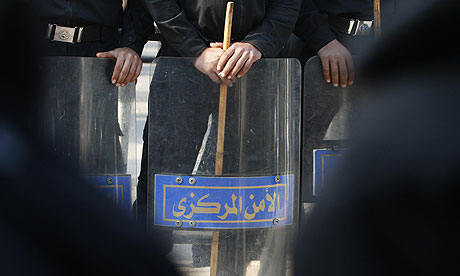Irish Foreign Minister Charles Flanagan took up the case of detained teenager Ibrahim Halawa with his Egyptian counterpart Sameh Shoukry on the sidelines of the United Nations Nuclear Non-Proliferation conference in New York.
The meeting between the two ministers came a day after the young Irishman was refused bail.
Halawa was arrested in August 2013 during protests in support of former Egyptian president Mohamed Morsi’s ouster at the Al- Fateh Mosque in the Ramses area of Cairo. He has been detained, alongside 493 other defendants, who face mass trial on charges of murder and attempted murder for their alleged role in violence at the protests over a year and a half ago.
A day before the two foreign ministers’ meeting, Ibrahim Halawa was denied bail and had his case postponed for the sixth time, until 6 June.
“In our discussion I expressed my disappointment that a decision on Ibrahim Halawa’s application for bail, an application supported by the Irish government, had been refused along with other bail applications in the case,” Flanagan is reported to have said.
“I underlined once again to Minister Shoukry the Government’s strong desire to see this young Irish citizen released by the Egyptian authorities as soon as possible so that he can return to his family and his studies in Dublin,” he said.
Halawa has been designated a ‘prisoner of conscience’ by Amnesty International, who warns that, if convicted, he could face the death penalty. They have also highlighted the worrying mental effects on the 19-year-old, who is believed to be held in the same area as prisoners sentenced to death in Tora prison. His family have called on the Irish government to put more pressure on Egyptian authorities.
Following the meeting, a statement from the Egyptian Ministry of Foreign Affairs suggested that Halawa is on trial for “charges of joining a terrorist group”. Shoukry also maintained that he respects the independence of the judiciary, and will not interfere with its work. He continued that Egyptian law guarantees all the rights of accused and a full judicial process.
According to Flanagan: “Minister Shoukry emphasised that the matter was currently before the Egyptian courts… [but] undertook to pursue the Irish Government’s concerns regarding Ibrahim Halawa’s welfare with the appropriate Egyptian authorities.”
In a comment captured on video during the meeting, Flanagan is heard telling Shoukry: “I am very conscious, as a lawyer myself, about the separation of powers [and] the independence of the judiciary… [that these matters] must take their course through the courts.”
During the protest in which at least 97 people died, Halawa was taking refuge with his three sisters in Al-Fateh mosque.
According to Amnesty International, there was an exchange of fire between the security forces and the outer areas of the mosque, on which basis security forces mass arrested protesters.
However, Amnesty holds that its research proves it is impossible that the protesters could have fired at security forces as they were locked inside an inner part of the mosque. Amnesty claim that of the over 100 witnesses due to be called in the trial the majority are police officers or government officials.


